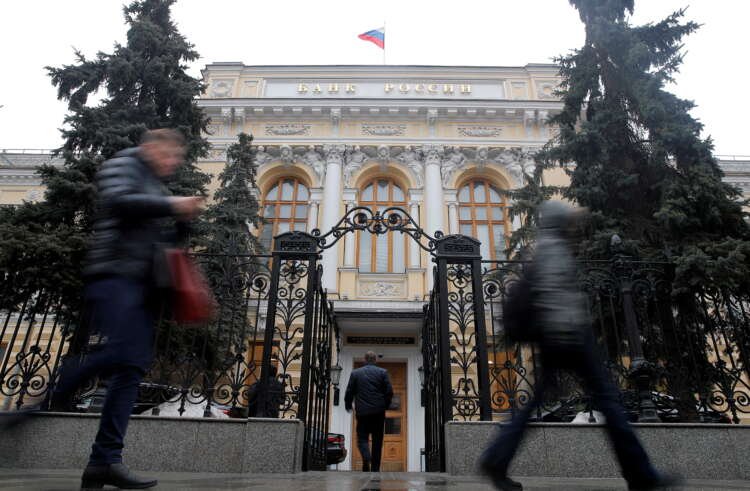Russian cenbank to start FX intervention as rouble skids to record low
Published by maria gbaf
Posted on February 24, 2022
3 min readLast updated: January 20, 2026

Published by maria gbaf
Posted on February 24, 2022
3 min readLast updated: January 20, 2026

By Elena Fabrichnaya and Andrey Ostroukh
MOSCOW (Reuters) – The Russian central bank will step into the market to support the rouble, it said on Thursday, as the local currency crashed to an all-time low after President Vladimir Putin authorised what he called a special military operation in Ukraine.
After weeks of denying plans to attack neighbouring Ukraine, Russian forces fired missiles at several cities in Ukraine and landed troops on its coast on Thursday.
Russia’s currency, bonds and stocks all tanked, prompting the central bank to announce its first foreign exchange intervention designed to shore up financial stability since 2014, when Russia annexed Crimea from Ukraine.
The rouble skidded to an all-time low of 89.60 against the dollar and neared a crucial threshold of 100 versus the euro. It was around 70 to the dollar and 81 to the euro before the recent round of geopolitical tensions between Moscow and the West started escalating in October.
“To stabilise the situation on the financial market, the Bank of Russia decided to start interventions on the currency market,” the bank said on Thursday. The move helped the rouble to slightly narrow losses.
As the United States warned it may cut off Russia’s top banks from dollar transactions should Moscow move its stoops into Ukraine, Russian lenders brought $5 billion in foreign exchange bank notes to the country in December and increased liquidity coverage of their foreign exchange assets.
On Thursday, the central bank increased daily dollar offers under foreign exchange swap operations with banks to $5 billion from $3 billion and sold 874 billion roubles ($10 billion) at a daily repo auction separately, to provide its 300 banks with additional liquidity.
The Bank of Russia has also decided to expand the list of securities it accepts as collateral in exchange for liquidity it provides. Sberbank, the country’s top bank, said that it was operating as normal so far on Thursday.
Markets are now bracing for the impact of fresh and harsh Western sanctions to punish Moscow for its invasion of Ukraine.
“The sanctions hit is going to be significant, unlike the soft sanctions imposed on Tuesday/Wednesday,” said Renaissance Capital.
The other tool the central bank has at hand to ease downside pressure on the rouble is its key interest rate. The bank is expected to continue monetary tightening as it struggles to rein in inflation, which is set to get a boost from the falling rouble.
($1 = 86.8650 roubles)
(Writing by Andrey Ostroukh and Katya Golubkova; Editing by Kim Coghill, Kenneth Maxwell and Emelia Sithole-Matarise)
Explore more articles in the Banking category











